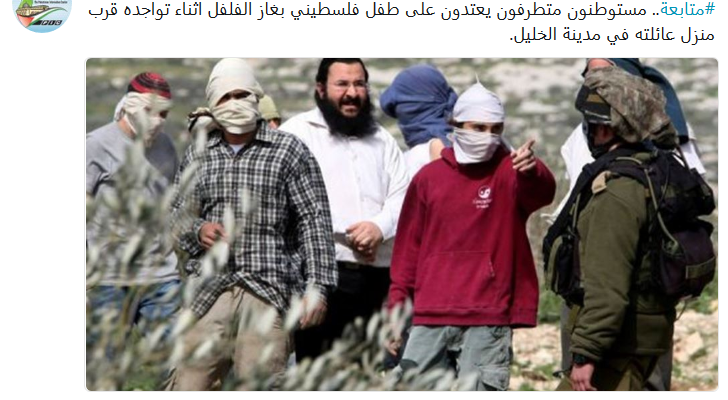The picture accompanying the defamatory tweet shows Rabbi Raziel Shevach, who was murdered in a terror attack eight months ago.
By: Beth Stern, United With Israel
On Thursday morning, a news site called the Palestinian Information Center (PIC) sent out a tweet accusing “extremist Jewish settlers” of assaulting a young Palestinian child near Hebron.
The veracity of the report was immediately put into doubt, however, as the picture underneath the inflammatory headline shows one very identifiable bearded man in black pants and white shirt standing among a group of some half dozen masked young men in casual clothes.
His name? Rabbi Raziel Shevach. The reason he was so instantly recognizable is that his face appeared in all Israeli and Jewish news media a mere eight months ago – when he was murdered in a drive-by shooting near his home of Havat Gilad by Ahmad Nassar Jarrar, a Palestinian terrorist.
So the short story on PIC about how “a local source” told them that a 10-year-old was rushed to a hospital after people from Kiryat Arba “attacked him with pepper spray in his face” was immediately countered angrily and in anguish by Shevach’s widow, Yael, also on Twitter.
“How, how how??? How can these be settlers today, how?? [My husband was] murdered eight months [ago] already!! May your names be erased, may God tear all of you to pieces, this is how you mock the dead! You have no honor!”
The death of Shevach, father of six, a rabbi and volunteer medic, led to the Israeli cabinet officially authorizing the recognition of his home village of Havat Gilad, which had been considered an “illegal outpost” in Samaria even though it had been established in 2002 on privately owned Jewish land.
This had given some comfort to his family, as Raziel had been known as a devoted member and unofficial rabbi of the community.
However, the fake news of the day obviously brought back a great deal of pain.
The fact that such specious accusations were made on PIC is not a surprise. According to Professor Gabriel Weimann of Haifa University, who tracks and studies terrorist websites, the PIC is part of Hamas’ online propaganda network. It has a long reach, too, as it boasts that its Arabic site is translated into nine languages, including English, French, Russian, Persian and Turkish.
